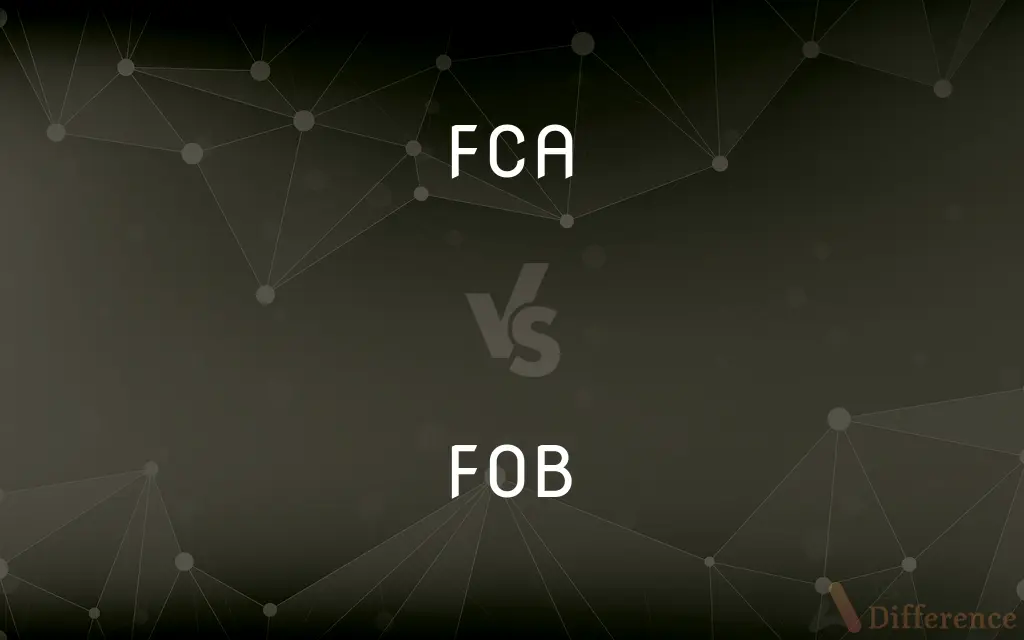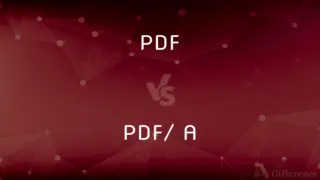FCA vs. FOB — What's the Difference?
By Urooj Arif & Fiza Rafique — Published on March 2, 2024
FCA (Free Carrier) places the responsibility on the seller to deliver goods to a specified location, while FOB (Free On Board) requires the seller to load goods onto a vessel chosen by the buyer, transferring risk at that point.

Difference Between FCA and FOB
Table of Contents
ADVERTISEMENT
Key Differences
FCA (Free Carrier) is an Incoterm where the seller delivers the goods, cleared for export, to a carrier chosen by the buyer at a specified location. This term can be used for any mode of transport, including multi-modal. The risk passes from seller to buyer when the goods are handed over to the first carrier, not necessarily at a port.
FOB (Free On Board), on the other hand, is specifically used for sea or inland waterway transport. The seller must load the goods on board a vessel nominated by the buyer. The risk and responsibility transfer from the seller to the buyer once the goods are on board the vessel. This means the seller is responsible for all costs and risks until the goods are loaded onto the ship.
Under FCA, the point of risk transfer is when the goods are handed over to the carrier, not when they are on board a vessel. This makes FCA more adaptable for modern logistics, especially in containerized transport, where goods are often handed over at a container terminal, not aboard a ship.
FOB requires the seller to clear the goods for export, which is a commonality with FCA. However, FOB specifically involves the loading of goods onto a ship, making it less flexible than FCA for air, road, or rail transport.
Choosing between FCA and FOB often depends on the agreement between buyer and seller and the specific needs of the transaction, including the type of goods, the selected mode of transportation, and logistics preferences.
ADVERTISEMENT
Comparison Chart
Mode of Transport
Any (air, sea, road, rail)
Sea or inland waterway only
Risk Transfer Point
When goods are handed over to the first carrier
When goods are on board the vessel
Export Clearance
Seller's responsibility
Seller's responsibility
Applicability
Suitable for containerized and multimodal transport
Best suited for bulk or non-containerized cargo
Responsibility for Loading
Carrier's (or buyer's, if carrier not specified) responsibility
Seller's responsibility until goods are on board
Compare with Definitions
FCA
Suitable for containerized freight.
FCA is chosen for shipping containers to an inland depot.
FOB
FOB means the seller loads goods onto a buyer-nominated vessel.
A grain exporter loads cargo onto a ship specified by the buyer.
FCA
The seller clears the goods for export.
Under FCA terms, the seller completes export documentation before delivery to the carrier.
FOB
Specifically for sea or inland water transport.
FOB is used for an overseas shipment of oil.
FCA
The risk transfers when goods are handed to the carrier.
Once the goods are with the first carrier, the buyer assumes risk.
FOB
Risk passes when goods are on board the vessel.
The seller's risk ends as the last of the cargo crosses the ship's rail.
FCA
FCA requires the seller to deliver goods to a carrier at a specified location.
The seller delivers goods to the buyer's chosen carrier at an agreed terminal.
FOB
Used for bulk or non-containerized goods.
FOB is preferred for large shipments of metals transported by sea.
FCA
It applies to all modes of transport.
A manufacturer uses FCA when shipping goods by rail to the buyer's forwarder.
FOB
The seller is responsible for export clearance.
Before loading, the seller ensures all export paperwork is in order.
Common Curiosities
Can FCA be used for sea shipments?
Yes, FCA can be used for any mode of transport, including sea shipments, especially for containerized cargo.
What does FOB stand for?
FOB stands for Free On Board, indicating the seller's obligation to load the goods on a vessel chosen by the buyer.
Who clears the goods for export in FCA and FOB?
In both FCA and FOB, the seller is responsible for clearing the goods for export.
What does FCA stand for?
FCA stands for Free Carrier, an Incoterm where the seller delivers goods to a specified carrier at a designated location.
Who is responsible for freight charges under FCA?
Under FCA, the buyer is typically responsible for the freight charges from the point of delivery to the carrier.
What happens if goods are damaged while loading under FOB?
If goods are damaged while loading under FOB, it is generally the seller's responsibility, as risk has not yet transferred to the buyer.
How do FCA and FOB affect freight forwarding?
FCA and FOB can dictate the responsibilities of freight forwarders, especially regarding the point of delivery and risk transfer.
Is FOB suitable for air freight?
No, FOB is intended for use in sea or inland waterway transport only.
Who pays the cost of loading the goods under FOB?
Under FOB terms, the seller bears the cost of loading the goods onto the vessel.
Can FOB be used for containerized cargo?
While possible, FCA is generally more suitable for containerized cargo due to the point of risk transfer.
What documentation is required for FCA and FOB shipments?
Both require commercial invoices, packing lists, and export clearance documents. Additional documents may be needed based on the cargo and destination.
How does risk transfer differ between FCA and FOB?
In FCA, risk transfers when goods are handed to the carrier, whereas in FOB, risk transfers once goods are on board the vessel.
Why might a seller prefer FCA over FOB?
A seller might prefer FCA for its flexibility across all transport modes and clearer point of risk transfer, especially for containerized goods.
Is insurance mandatory under FCA and FOB?
Insurance is not mandatory under FCA or FOB, but it is highly recommended. Responsibility for obtaining insurance depends on the agreement between buyer and seller.
Can FCA and FOB be used interchangeably?
No, they serve different needs and are suited to different types of transport and cargo. The choice depends on the specifics of the shipment and agreement between parties.
Share Your Discovery

Previous Comparison
Fixed Mindset vs. Growth Mindset
Next Comparison
PDF vs. PDF/ AAuthor Spotlight
Written by
Urooj ArifUrooj is a skilled content writer at Ask Difference, known for her exceptional ability to simplify complex topics into engaging and informative content. With a passion for research and a flair for clear, concise writing, she consistently delivers articles that resonate with our diverse audience.
Co-written by
Fiza RafiqueFiza Rafique is a skilled content writer at AskDifference.com, where she meticulously refines and enhances written pieces. Drawing from her vast editorial expertise, Fiza ensures clarity, accuracy, and precision in every article. Passionate about language, she continually seeks to elevate the quality of content for readers worldwide.
















































